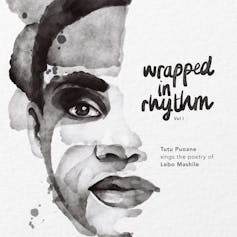From her base in Belgium, proudly South African singer, artist and actor Tutu Puoane has carved an international career predicated on consistency and mastery. Her new album, Wrapped in Rhythm Vol 1, features the writing of South African poet and cultural activist Lebo Mashile.
Born Nonthuthuzelo Puoane in May 1979, she was raised in the Pretoria township of Mamelodi. Townships are urban black areas created under the apartheid policies of South Africa’s former government.

Puoane began her artistic training at Fuba (the Federated Union of Black Artists), founded as an alternative training academy for artists denied access to whites-only institutions. She was under the tutelage of indigenous African music scholar and practitioner Geoff Mapaya, who was instrumental in her enrolment in a university jazz programme. Studying further in Europe, she would meet her husband, pianist and lifelong artistic collaborator, Ewout Pierreux, in Belgium.
My first experience of Puoane on stage was at the University of Cape Town while she was on a visit to South Africa. I was a young jazz student then. Her rendition of the 1939 classic What’s New? rendered me a relentless admirer of her work. I count this experience as one of the many inspirations behind becoming the musician and jazz academic I am today.
Her award-winning discography includes Quiet Now (2009), Song (2007) and Breathe (2012). Though she prefers not to be categorised purely as a jazz singer, Puoane’s vocal skills have contributed immensely to the contemporary jazz landscape in South Africa, where her music is part of the prescribed repertoire in university jazz vocal programmes. In original compositions, her pen flows effortlessly between English and her mother tongue Sepedi, latching her roots securely in the arches of every note she sings.
On Wrapped In Rhythm Puoane sings poetry from Mashile’s award-winning 2005 anthology In a Ribbon of Rhythm, a collection that deals with identity, otherness, violence against women and the elusiveness of South Africa’s “rainbow nation”. The result is an incredible, exquisite album that is also a profound intersection of artistic minds. Mashile and Puoane exemplify the necessity of black women’s work in teaching us about ourselves. Intrigued by the process of adaptation from poetry to music, I chatted with Puoane.
Nomfundo Xaluva: In a 2020 live performance in Amsterdam, you say that when you read the collection, you heard music. Talk to us about that initial encounter with the text.
Tutu Puoane: US writer Aja Monet said once that “words are symbols of sound”. That was precisely what Lebo’s words were to me. It was in a way quite spiritual. Nothing like that had ever happened to me before. The poems from In A Ribbon Of Rhythm were already flowing with so much melody, lyricism and, of course, rhythm. I imagined vocalists like Joni Mitchell, Sade, Laura Mvula singing Lebo’s words. So I started recording melodies with the poems on my phone, just rough sketches of what I was hearing in my head. Some songs are exactly as I had improvised them the first time and recorded them on my phone. Some had a lot more work of course.
Nomfundo Xaluva: What we know for sure about Wrapped in Rhythm is that the lyrics came first. Talk us through the process of adaptation as it pertains to melody, instrumentation and groove. Was this a collaborative process with your core rhythm section? I know you’ve been playing this music with these guys (Clemens van der Feen on bass, Dre Pallemaerts on drums and Ewout Pierreux on piano) for some years now.
Tutu Puoane: Working with talented and experienced musicians definitely helped shape this music. I chose these musicians because of who they are as musicians. I knew they would elevate whatever I heard in my head and bring it to another level. All of them are quite sensitive to lyrics as well. They understood very well what the poems were saying to me and what they meant to me, so they approached the music with all that information in mind.
The process of writing the songs was a different approach for me and Ewout. Usually the music comes first (harmony, groove, structure), then I come and start improvising melodies and lyrics. This time, the lyric was there first. On some songs the melody came spontaneously. Some songs needed just a tiny bit of adaptation. I added a short verse in Sepedi on the poem The Way We Love in the song titled When We Love. This will be heard in a year on volume two though. The tune just needed an extra verse.
Nomfundo Xaluva: When I watch and listen to Lebo Mashile recite poetry – I’d pay to hear her recite a recipe, she’s that good – there’s a physicality she applies to the text. It’s her entire body at work. As a vocalist, what techniques did you apply, if any, to truly embody the text? Also, what’s been the marked difference between performing this music live and performing it in a recording studio?
Tutu Puoane: Breathe. Breathe. Breathe! Let go of the belly. I still have to remind myself of this every day. Letting go of the belly truly helps me calm down. Taking a long breath helps me to really focus in on a word, and decide what that word means to me and whether or not I want to emphasise it. All this helped me tremendously in the studio. It helped me to connect much deeper with the words and the meanings behind each piece. I had to find the audience inside me to convey these words to. When I’m in front of an audience, it’s much easier for me because I have live, breathing, laughing, sighing, smiling, coughing humans in front of me to sing to, to give to, to exchange energies with. In the studio I have to find all that within myself and that can be a little challenging sometimes.
Nomfundo Xaluva: I’m really inspired by the work of black women in centralising their stories and finding expression through each other’s crafts. In this decade-long journey, what has Lebo’s artistry transferred to you and, most importantly, how has it transformed you?
Tutu Puoane: Sjoh, what a wonderful question. Hope! This work has rejuvenated my optimism for South Africa and its future. Through Lebo, I’m discovering other poets at home, young talented people who are doing amazing things in this field. Lebo’s generosity has taught me that it is possible for something that was already birthed to be given a new life, and that even its birth-mother can find new meaning in their own work, 20 years down the line.

